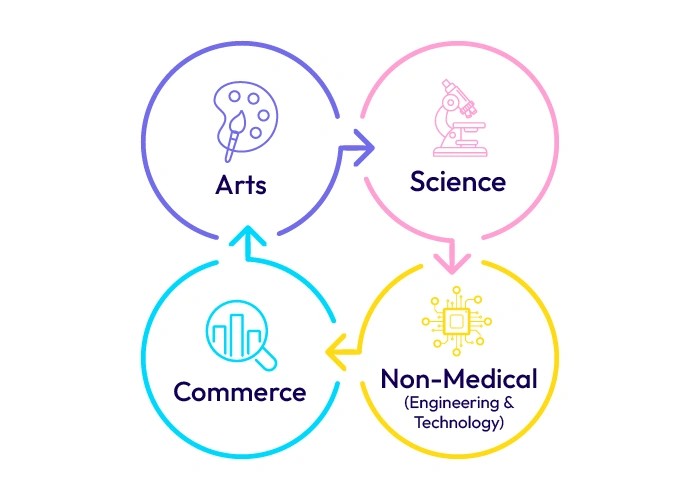Study in Australia for Indian Students after 12th
SKIP TO WHAT YOU'RE LOOKING FOR
"It's a big world out there, it would be a shame not to experience it."
– Jo Andrews
Top Reasons to Study in Australia
Australia provides an education like no other. Australia's vibrant culture, global tie-ups, atmosphere and climate make it a dream spot for undergraduates. Australia is an ideal place to study as:
- High-Quality Education: Globally recognized degrees and cutting-edge research opportunities.
- Diverse Course Options: Wide range of programs across various fields of study.
- Multicultural Environment: Exposure to diverse cultures and international networks.
- Student Support Services: Comprehensive support for academic and personal development.
- Post-Study Employment Plans: There are numerous employment prospects in Australia, which is ideal for students.
Australian Education System for International Students
The Australian education system is somewhat different from what the traditional norms are.
Types of Institutions
- Universities
- Offer undergraduate, postgraduate, and research degrees.
- Ex: Australian National University, University of Melbourne, University of Sydney.
- Colleges
- Provide diploma and advanced diploma courses.
- Focus on practical and vocational training.
- Vocational Schools (TAFE)
- Technical and Further Education (TAFE) institutes offer vocational courses.
- Prepare students for specific trades and industries.
Quality Assurance Practices
- TEQSA: Tertiary Education Quality and Standards Agency ensures quality and compliance in higher education.
- CRICOS: Commonwealth Register of Institutions and Courses for Overseas Students lists approved institutions and courses for international students.
- ESOS Act: Education Services for Overseas Students Act protects the rights of international students.
Support Systems for International Students
- Language Support: English language courses and tutoring services.
- Integration Programs: Orientation programs, cultural workshops, and student associations.
- Academic Support: Mentorship, study skills workshops, and libraries.
- Health and Wellbeing: Access to counselling services and health facilities.
- Career Services: Job placement assistance, internships, and career counselling.
Steps to Study in Australia
- Research Courses and Institutions: Choose a program and institution that aligns with your academic goals.
- Admission Requirements: You must meet the academic, linguistics, and other requirements.
- Apply for Admission: Submit applications to selected institutions.
- Receive Offer Letter: Obtain a Confirmation of Enrollment (CoE) from the institution.
- Apply for a Student Visa: Apply for the Student Visa (Subclass 500) with necessary documentation.
- Prepare for Departure: Arrange accommodation, purchase health insurance (OSHC), and plan your travel to Australia.
Australia's education system offers a supportive and enriching environment for international students, making it an excellent destination for higher education.
Admission Requirements to Study in Australia after 12th
If you want to study in Australia after 12th, you must meet these requirements. These are:
General Requirements
- Academic Credentials
- Completed 12th grade with a recognized certificate.
- Minimum percentage/grade as specified by the institution.
- Language Proficiency
- English: IELTS (6.0-7.0), TOEFL (60-100), or PTE (50-65).
Program-Specific Requirements
- Arts and Humanities
- Portfolio (for design and fine arts courses)
- Statement of Purpose (SOP)
- Science and Technology
- Entrance Exams: SAT/ACT (for some institutions)
- Prerequisite Subjects: Maths, Physics, Chemistry (depending on the course)
- Commerce and Business
- Entrance Exams: SAT/ACT (for some institutions)
- Work Experience (for advanced business programs)
- Application Deadlines
- February intake: Apply by November
- July intake: Apply by April
- Document Submission:
- Transcripts, SOP, Letters of Recommendation (LOR)
Checklist
- Completed application form
- Academic transcripts
- English language test scores
- Entrance exam scores (if required)
- SOP
- LORs
- Portfolio (if required)
- Passport copy
- Proof of funds
Top Courses to Study in Australia After 12th
There is a wide array of options to choose from when it comes to study in Australia after 12th. These are:
- Arts
- Bachelor of Arts (BA): Specializations in History, Sociology, Political Science, and Literature.
- Bachelor of Fine Arts (BFA): Focus on Visual Arts, Performing Arts, and Digital Media.
- Bachelor of Design: Includes Fashion Design, Graphic Design, and Interior Design.
- Bachelor of Communication: Covers Journalism, Public Relations, and Media Studies.
- Science
- Bachelor of Science (BSc): Majors in Biology, Chemistry, Physics, and Environmental Science.
- Bachelor of Biomedical Science: Focus on medical research and laboratory sciences.
- Bachelor of Computer Science: Covers software development, artificial intelligence, and cybersecurity.
- Bachelor of Biotechnology: Combines biology with technology for medical and industrial applications.
- Commerce
- Bachelor of Commerce (BCom): Specialisations in Accounting, Finance, Marketing, and Management.
- Bachelor of Business Administration (BBA): Focus on leadership, business strategies, and entrepreneurship.
- Bachelor of Economics: Covers economic theory, econometrics, and policy analysis.
- Bachelor of International Business: Focus on global trade, international marketing, and cross-cultural management.
- Non-Medical (Engineering & Technology)
- Bachelor of Engineering (BEng): Specialisations in Civil, Mechanical, Electrical, and Chemical Engineering.
- Bachelor of Information Technology (BIT): Covers network security, software development, and data science.
- Bachelor of Architecture (BArch): Focus on architectural design, urban planning, and sustainable development.
- Bachelor of Data Science: Emphasis on big data analytics, machine learning, and statistical modelling.
Cost of Studying in Australia After 12th for Indian Students
The cost of studying in Australia varies by course and institution. On average:
- Arts and Humanities: Tuition fees range from AUD 20,000 to AUD 35,000 per year (INR 10-18 lakhs).
- Sciences: Fees typically range from AUD 25,000 to AUD 45,000 per year (INR 13-23 lakhs).
- Commerce: Tuition costs range from AUD 20,000 to AUD 40,000 per year (INR 10-21 lakhs).
- Non-Medical: Engineering and technology courses range from AUD 30,000 to AUD 50,000 per year (INR 16-26 lakhs).
Living expenses average around AUD 21,000 per year (INR 11 lakhs). These costs are approximate and can vary based on the specific institution and location.
Cities to Study in Australia After 12th
- Melbourne
Housing some of the top universities in the world like the University of Melbourne and Monash University, Melbourne is considered to be the cultural capital of Australia. You can see a diverse community, a vibrant display of art and culture and generous options for student accommodations. The city's lively nightlife and coffee culture enhance the student experience.
- Sydney
Remember the iconic landmarks- Opera House and Harbour Bridge? They're located in sydney along with top institutions such as the University of Sydney. It provides ample career opportunities, outdoor activities, and a cosmopolitan lifestyle with diverse dining and entertainment options.
- Brisbane
Brisbane is known for having an amazing climate that usually stays warm with a cool breeze. It is affordable, spacious and has a friendly atmosphere. This city houses the University of Queensland and QUT that offer quality education. The city combines cultural experiences with outdoor activities, making it a pleasant place for students.
- Adelaide
This city is known for being compact and accessible to all and its community and festivities. It has low tuition fees which is ideal for international students. The University of Adelaide is located here.
Visa Procedure to Study in Australia After 12th
The following is a step-by-step guide to obtaining a student visa for students who wish to study in Australia after 12th:
Step 1: Know the Visa Type
- Visa Type: For those wishing to study in Australia, they will require the Student Visa (Subclass 500).
Step 2: Gather Required Documentation
- Confirmation of Enrollment (CoE): Get CoE from an Australian educational institution. You must apply and be accepted into a full-time course listed on the Commonwealth Register of Institutions and Courses for Overseas Students (CRICOS).
- Passport: Ensure that your passport remains valid for at least six months beyond your intended stay in Australia.
- English Language Proficiency: You should provide proof of English language ability through IELTS, TOEFL or PTE Academic tests except exemptions.
- Proof of Funds: Show that you have enough money available to support tuition fees, travel expenses and living costs. This can come in the form of bank statements, scholarship letters or financial support guarantees.
- Overseas Student Health Cover (OSHC): Purchase OSHC while you are staying in Australia.
- Health Examinations: Undergo necessary health examinations.
- Character Certificate: Provide a character certificate.
Step 3: Apply for the Visa
- ImmiAccount: Create an account on this website by registering with the Department of Home Affairs .
- Form Submission: Fill out the online application frame (Frame 157A) precisely with all required subtle elements.
- Visa Fee: Pay the application fee, which is approximately AUD 1,600, though this may vary.
Step 4: Wait for Visa Decision
- Processing Time: In general, it will take between four to twelve weeks. Always check the current processing times from the Department of Home Affairs website.
Step 5: Post Visa Approval
- Visa Grant Notification: A visa grant notification letter will be sent to you containing your visa grant number, the date your visa starts and visa conditions.
- Pre Departure Preparations: Plan your travel and accommodation in Australia. Get familiar with student life and resources available in Australia.
Common Issues and How to Handle Them
- Incomplete Documentation: Make sure all documents are complete and correctly translated (if necessary) in order to avoid delays.
- Financial Proof: Keep current financial documentation that is enough to prevent a refusal of visas.
- Health Insurance: Buy OSHC for the entire period of the visa coverage; keep purchasing it throughout until its end-date too.
- Character Concerns: Obtain a police certificate that indicates no restrictions concerning character issues or other related problems.
Maintaining Eligibility During the Study Period
- Academic Performance: Satisfactory academic progress must be maintained according to the requirements of your institution.
- Work Restrictions: Abide by the work conditions specified on your visa, typically allowing 40 hours per fortnight during the term and unlimited hours during scheduled breaks.
- Visa Conditions: Comply with all conditions listed in your visa grant notification, including notifying your institution of your address within seven days of arrival and any address changes.
Choosing Australia as the place you want to spend your undergraduate life is an excellent choice as you get to experience diversity, culture, wildlife, and quality education. The universities here are recognised worldwide and offer the highest-quality education with world-renowned institutes.
If this is your dream, contact our expert counsellors at AECC today! Our expert counsellors will guide you thoroughly regarding all the queries you may have regarding study in Australia after 12th. We understand how important it is to embark on an educational journey in a foreign country, and we strive to stay beside you and help you succeed every step of the way.

Nidhi Mehrotra
Nidhi Mehrotra, with extensive experience in Australian education, has helped countless students achieve their dreams of studying in Australia. Known for her expertise in visa applications and course selection, her guidance ensures success. Outside work, she enjoys reading and exploring new recipes, adding a personal touch to her mentoring.
Categories








